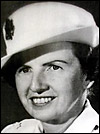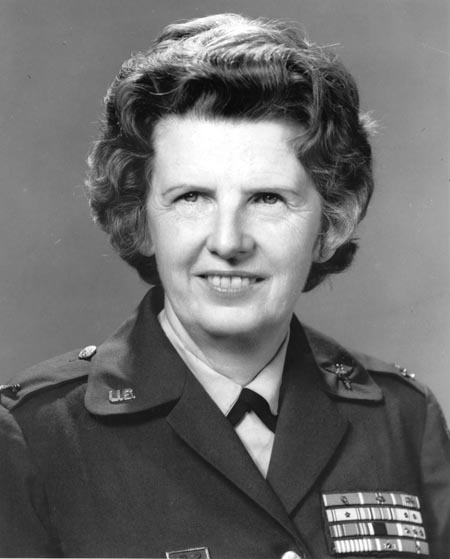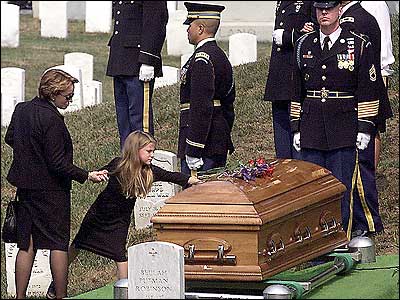From a press report: Wednesday, July 03, 2002
Army buries nurse with honors for career of courage under fire

A survivor of two wars, a prison camp and near starvation, Colonel Ruby Bradley, one of the most decorated women in U.S. military history, was laid to rest in Arlington National Cemetery yesterday, nearly 40 years after she retired from the
Army.
Colonel Bradley, a native of Spencer, West Virginia, died May 28 in Hazard, Kentucky, at age 94 after a heart attack.
Her military record included 34 medals and citations of bravery, including two Legion of Merit medals, two Bronze stars, two Presidential Emblems, the World War II Victory Medal and the U.N. Service Medal.
She was also the recipient of the Florence Nightingale Medal, the Red Cross’ highest international honor.
Colonel Bradley was honored with a military funeral in the historic cemetery overlooking the nation’s capital. Her coffin was escorted to the grave site by six white horses, and the symbolic riderless horse followed, while the Army Band played traditional hymns.
A firing party of seven sounded three volleys in her honor, and the flag covering her coffin was folded and presented to a relative. Several family members and Army soldiers laid roses on the coffin, saluting as they turned to leave.
Colonel Bradley entered the Army Nurse Corps as a surgical nurse in 1934. When the Japanese attacked Pearl Harbor in 1941, Colonel Bradley was 34 and serving at Camp John Hay in the Philippines.
Three weeks later, she was captured; in 1943, she was moved to the Santo Tomas Internment Camp in Manila, the Filipino capital. It was there that she and several other imprisoned nurses earned the title “Angels in Fatigues” from fellow captives.
For the next several months, she provided medical help to the prisoners and sought to feed starving children by shoving food into her pockets whenever she could, often going hungry herself.
The weight she shed made room in her uniform for smuggling surgical equipment into the prisoner-of-war camp that she used to assist in 230 operations and deliver 13 children.
On February 3, 1945, U.S. troops stormed the gates of the Japanese camp and liberated Colonel Bradley and her fellow prisoners, ending her three years of captivity.
At 80 pounds, Colonel Bradley returned home to West Virginia and waited five years before returning to the battlefield during the Korean War.
Colonel Bradley served as a frontline Army nurse in evacuation hospitals in Korea. It was there that she refused to leave until she had loaded the sick and wounded onto a plane while surrounded by 100,000 Chinese soldiers.
She escaped just in time, as her ambulance exploded behind her.
“You got to get out in a hurry when you have somebody behind you with a gun,” Colonel Bradley said once in a TV interview.
After three decades of military service, Colonel Bradley retired from the Army in 1963.
On December 1, 1999, then 91 years of age, Colonel Ruby Bradley received more than a dozen military awards to replace those she had lost over the years. She is the nation’s most highly-decorated female veteran. Senator Rockefeller presented the medals and ribbons to Bradley, a veteran of World War II and the Korean War, who
lives in Spencer, West Virginia. She was a U.S. Army nurse and a POW for two years in the Philippines and was known as the “Angel in Fatigues” at Santo Tomas Internment Camp in Manila. The replacement awards reportedly included the Legion of Merit medals, the Bronze Star, two Presidential Emblems, the Meritorious Unit Emblem, The American Defense Service Medal, the American Campaign Medal, the Asiatic-Pacific Campaign Medal, the World War II Victory Medal, the Army Occupational Medal with Japan clasp, three Korea Service medals, the Philippine Liberation Medal, the Philippine Independence Ribbon and the United Nations Service Medal.
Michael Robert Patterson was born in Arlington and is the son of a former officer of the US Army. So it was no wonder that sooner or later his interests drew him to American history and especially to American military history. Many of his articles can be found on renowned portals like the New York Times, Washingtonpost or Wikipedia.
Reviewed by: Michael Howard


